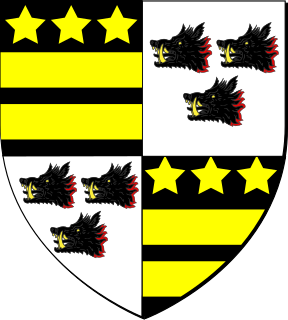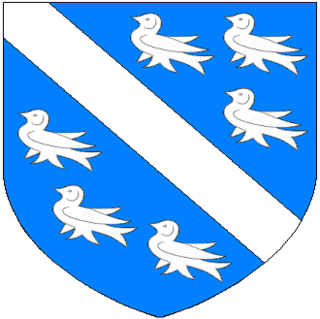
Earl of Strafford is a title that has been created three times in English and British history.

Baron Carbery, of Carbery in the County of Cork, is a title in the Peerage of Ireland. It was created in 1715 for George Evans, with remainder to the heirs male of his father and namesake George Evans, a supporter of William and Mary during the Glorious Revolution, who had earlier declined the offer of a peerage. After his elevation to the peerage Lord Carbery represented Westbury in the House of Commons. He was succeeded by his eldest son, the second Baron. He also sat as Member of Parliament for Westbury. His grandson, the fourth Baron, briefly represented Rutland in Parliament. He was succeeded by his uncle, the fifth Baron. On his death the line of the eldest son of the first Baron failed. He was succeeded by his first cousin once removed, the sixth Baron, who had previously succeeded his father as second Baronet, of Castle Freke. Lord Carbery sat in the House of Lords as an Irish Representative Peer from 1824 to 1845. His nephew, the eighth Baron, was an Irish Representative Peer from 1891 to 1894. As of 2014 the titles are held by the latter's great-great-grandson, the twelfth Baron, who succeeded his father in 2012.

Earl Harcourt, of Stanton Harcourt in the County of Oxford, was a title in the Peerage of Great Britain. It was created in 1749 for Simon Harcourt, 2nd Viscount Harcourt. He was made Viscount Nuneham at the same time, also in the Peerage of Great Britain. Harcourt was the son of the Honourable Simon Harcourt and the grandson of Simon Harcourt, Lord High Chancellor of Great Britain, who had been created Baron Harcourt, of Stanton Harcourt in the County of Oxford, on 3 September 1711, and Viscount Harcourt, of Stanton Harcourt in the County of Oxford, on 24 July 1721. Both these titles were also in the Peerage of Great Britain.
William Alington, 1st Baron Alington of Killard was an Irish peer, the son of Sir Giles Alington. He was created 1st Baron Alington of Killard, on 28 July 1642.

Sir Geoffrey de Luterel I, was a courtier and confidant of King John, whom he served as a minister.
John Burke was an Irish genealogist, and the original publisher of Burke's Peerage. He was the father of Sir Bernard Burke, a British officer of arms and genealogist.

John Savage, 2nd Earl Rivers was a wealthy English nobleman, politician and Royalist from Cheshire.

Brereton Hall is a country house to the north of the village of Brereton Green, adjacent to St Oswald's Church, in the civil parish of Brereton, Cheshire, England. It is recorded in the National Heritage List for England as a designated Grade I listed building.
The Vernon family was a wealthy, prolific and widespread English family with 11th-century origins in Vernon, Normandy, France. Their extant titles include Baron Vernon and Vernon baronets of Shotwick Park.

Sir Thomas Leigh was an English merchant and Lord Mayor of London in 1558-59. He served as a City Alderman from 1552 until 1571.

Henry O'Brien, 5th Earl of ThomondPC (Ire) (1588–1639), styled Lord Ibrickane until 1624, was summoned to the House of Lords of the Irish Parliament of 1613–1615.
Sir Gerald Fitzgerald, 3rd Lord Decies was the son of John Fitzgerald and Ellen, daughter of Maurice FitzGibbon, the White Knight.

William Byron, 4th Baron Byron was an English nobleman, politician, peer, and Gentleman of the Bedchamber to Prince George of Denmark.
The Fenton Baronetcy, of Mitchelstown in the County of Cork, was a title in the Baronetage of Ireland. It was created on 22 July 1661 for Maurice Fenton. The baronetcy became extinct on 17 March 1670, with the death of his son William Fenton.

Thomas Cromwell, 1st Earl of Ardglass, 11 June 1594 to 20 November 1653, was an English nobleman, son of Edward Cromwell, 3rd Baron Cromwell and his second wife Frances Rugge.
William Mayne, 1st Baron Newhaven PC, known as Sir William Mayne, Bt, between 1763 and 1776, was a British merchant and politician who sat in the House of Commons from 1774 to 1790.

William Brereton, 1st Baron Brereton was an English politician who sat in the House of Commons at various times between 1597 and 1622. He was created a peer in the Peerage of Ireland in 1624 as Baron Brereton.
Elizabeth Pakenham, 1st Countess of Longford, formerly Elizabeth Cuffe, was an Irish noblewoman. She was the wife of Thomas Pakenham, 1st Baron Longford, the mother of Edward Michael Pakenham, 2nd Baron Longford, and the grandmother of Thomas Pakenham, 2nd Earl of Longford.
Events from the year 1624 in Ireland.
Edward Ward, 7th Baron Dudley and 2nd Baron Ward (1631-1701) succeeded his father, Humble Ward as the 2nd Baron Ward in 1670 and his mother, Frances Ward as 7th Baron Dudley in 1697. He married Frances Brereton, the daughter of the Parliamentary General, Sir William Brereton. He died on 3 August 1701 and was buried at Himley.











